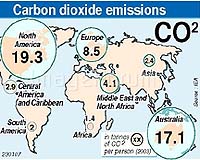 |
Washington (UPI) Oct 23, 2009 Business Roundtable, an association of chief executive officers of major U.S. companies, in a report released Wednesday urged Congress and the Obama administration to support renewable and traditional sources of energy as the country transitions to a low-carbon economy. "Unfinished Business: The Missing Elements of a Sustainable Energy and Climate Policy," outlines key policies that Congress has not yet addressed in its effort to craft climate change and energy legislation. A climate change policy that excludes some energy sources and technologies will result in a failure to meet national greenhouse gas reduction targets as well as stall the country's return to economic growth, according to the report. "To satisfactorily address our energy and climate needs, a commitment to energy efficiency and all forms of energy production, including expanded oil and natural gas production, will be required," the report states. "We need to put all energy sources on the table and commit to the development and deployment of advanced energy technologies," Michael G. Morris, chairman, president and CEO of American Electric Power and chairman of Business Roundtable's Sustainable Growth Initiative, said in a release. "This is essential to forging climate change policy that is sustainable from an environmental, economic and energy security perspective." Noting that the United States can and should use energy more efficiently and use renewables and other new sources of energy where possible, "the reality is that we likely will continue to rely on oil, natural gas and coal for the majority of our energy for decades to come," the report states. Renewables, the report said, have resource and economic limitations that "make it unlikely that they will displace traditional fossil fuels any time soon." Business Roundtable called on Congress to expand nuclear power, which it referred to as "the only existing, scalable low-carbon baseload generation technology"; to maintain coal's long-term viability through investing in research and development, cost-sharing, regulatory reform and by providing incentives for the development of carbon capture and storage technology; expand and modernize the country's electric grid; provide access for oil and natural gas exploration and production "to enhance domestic energy security"; and to increase energy efficiency in residential and commercial buildings and the industrial sector. "These are the policies we must pursue to make our nation's transition to a low-carbon economy as sustainable as possible," John J. Castellani, president of Business Roundtable, said in the release. "President Obama and Congress have the opportunity today to build a lasting solution for the future by enacting legislation that will transform the way we use established American energy sources even as we explore new ones. By doing so, we can accelerate progress towards our climate goals, while supporting the economy during this time of transition." Share This Article With Planet Earth
Related Links
 Industrialised nations' CO2 emissions rose in 2007: UN
Industrialised nations' CO2 emissions rose in 2007: UNBerlin (AFP) Oct 21, 2009 Carbon emissions by industrialised nations increased one percent in 2007, a "worrying" rise ahead of a crunch climate summit in Copenhagen in December, the UN climate agency said Wednesday. Emissions in 2007 by 40 industrialised countries with reporting obligations under the UN Framework Convention on Climate Change (UNFCCC) were around four percent below 1990 levels, the Bonn-based UN ... read more |
|
| The content herein, unless otherwise known to be public domain, are Copyright 1995-2009 - SpaceDaily. AFP and UPI Wire Stories are copyright Agence France-Presse and United Press International. ESA Portal Reports are copyright European Space Agency. All NASA sourced material is public domain. Additional copyrights may apply in whole or part to other bona fide parties. Advertising does not imply endorsement,agreement or approval of any opinions, statements or information provided by SpaceDaily on any Web page published or hosted by SpaceDaily. Privacy Statement |